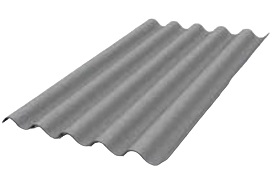
Corrugated and semi-corrugated asbestos cement sheets are construction materials composed of a mixture of asbestos fibres and cement, formed into a corrugated or semi-corrugated pattern. These sheets are renowned for their durability, strength, and fire-resistant properties, making them popular choices for roofing and cladding in various industrial, agricultural, and residential applications. The corrugated design provides added structural integrity and allows for efficient water drainage, making these sheets suitable for use in regions prone to heavy rainfall. Semi-corrugated asbestos cement sheets offer a compromise between the strength of fully corrugated sheets and the smoother appearance of flat sheets, providing versatility in architectural designs while maintaining the benefits of asbestos cement construction materials. However, the use of asbestos in these sheets has raised concerns regarding potential health risks associated with asbestos exposure, leading to regulations and restrictions on their use and disposal in many countries.
IS 459:1992 is a crucial standard for the production and quality of corrugated and semi-corrugated asbestos cement sheets. This standard plays a vital role in ensuring the safety and reliability of these construction materials, which are widely used in various applications such as roofing and cladding. By establishing specific requirements for raw materials, manufacturing processes, dimensions, and physical properties, IS 459:1992 helps manufacturers produce sheets that meet minimum quality benchmarks, ensuring durability and resilience in different environmental conditions. Compliance with this standard not only ensures the structural integrity of buildings but also safeguards the health and well-being of individuals by regulating asbestos content and ensuring that the sheets are free from defects that could pose risks during installation or use. Adherence to IS 459:1992 promotes consistency and uniformity in the production of these sheets, facilitating interchangeability and compatibility in construction projects.
Note: Obtaining the ISI/BIS Certification is a mandatory requirement for manufacturers of Corrugated and Semi – Corrugated Asbestos Cement Sheets to sell their products in the Indian market.
In India, manufacturers must obtain ISI/BIS certification for their Corrugated and Semi-Corrugated Asbestos Cement Sheets to lawfully sell these products. This certification, mandated by Indian regulations, ensures adherence to specific quality and safety standards set by the BIS for the production and distribution of asbestos cement sheets. Without this certification, manufacturers face legal repercussions and challenges in accessing the Indian market. Thus, obtaining ISI/BIS certification is not only a regulatory obligation but also a critical step for manufacturers to demonstrate the reliability, durability, and safety of their asbestos cement sheets. This certification process underscores the importance of ensuring the integrity and suitability of construction materials, instilling confidence among stakeholders in the construction industry regarding its compliance with Indian standards for usage and distribution.
Indian Standards Institute, or ISI was renamed the Bureau of Indian Standards (BIS) in 1987. The official mark that the Bureau of Indian Standards provides for manufacturers of various goods is the ISI Mark. It is used to indicate compliance with Indian standards (IS) set by the Bureau of Indian Standards (BIS) and has been used as a conformity marking for industrial products. Manufacturers received permission from BIS to use the ISI Mark on items that comply with relevant Indian requirements through the product certification program.
Only manufacturers (domestic or foreign) who produce the finished product will be awarded ISI Certification. This will not be given to any product importers, traders, dealers, or distributors.
The following documentation is required to get an ISI certification:
For more detailed information, please click here.
There are two approaches for Indian manufacturers to become certified with the ISI Mark:
Regular Procedure
With the possible exception of cases deemed "All India first," which might take up to 180 days, the licensing procedure is expected to be finished in 120 days. This timeline starts on the day the application is received, assuming that at different points in time the documentation, unit assessment, and product conformance are all deemed acceptable.
Step 1: Manufacturing Unit Customization in Compliance with Applicable Indian Standards
Step 2: Submission of the Application Form
For more detailed information, please click here.
Simplified Procedure
This is a much faster process than the standard procedure. After a factory inspection is deemed satisfactory and the initial evaluation establishes that the sample complies with the applicable Indian Standard(s), the license application process is expected to be finished in 30 days.
Step 1: Adapting the Manufacturing Unit to Comply with the Relevant Indian Standard
Step 2: Sample Testing
For more detailed information, please click here
The process of obtaining ISI Mark Certification for Foreign Manufacturers typically includes the following steps:
Step 1: Application
Step 2: Query Raised (If Any)
For more detailed information, please click here.
Brand Liaison provides helpful support for achieving ISI Mark Certification. Among our offerings are:
Please click here to get in contact with our team of specialists for a deeper explanation of the paperwork and steps needed to get ISI Mark Certification.